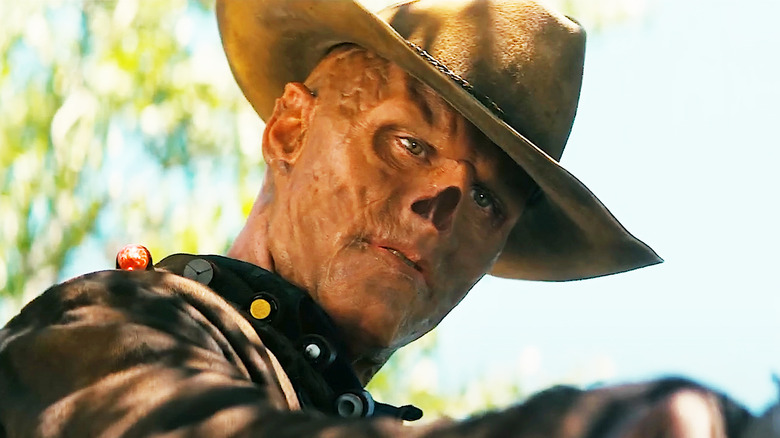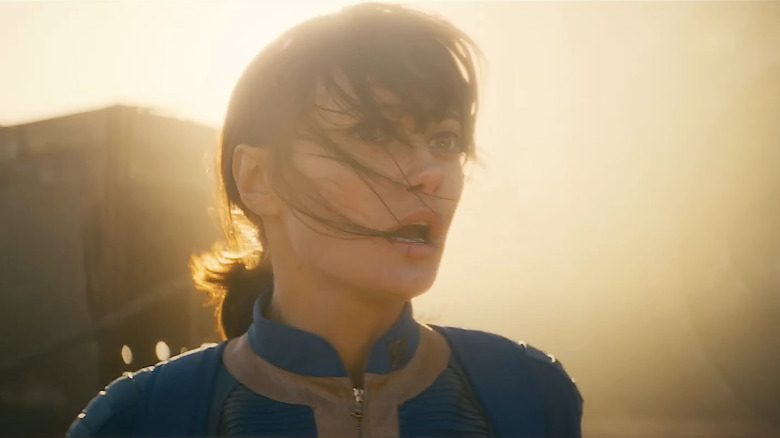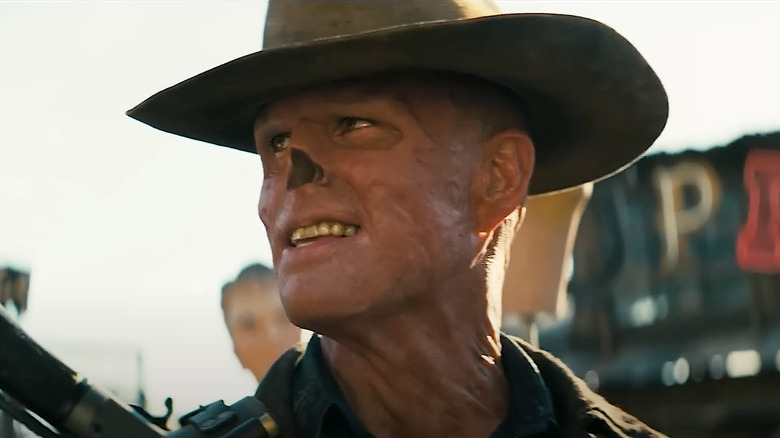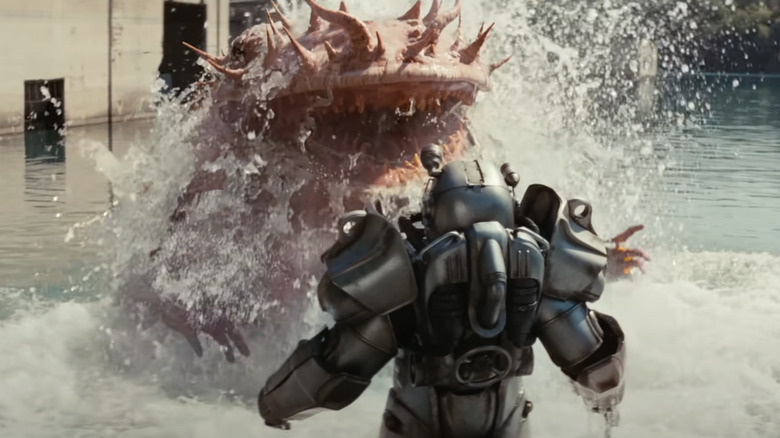Fallout Episode 3 Takes A Cheeky Jab At The Video Games
The stellar video game adaptation that is "Fallout" has finally arrived on Prime Video. The show presents an immersive alternate future that feels akin to the games while weaving a whole new wasteland-based tale. One of the "Fallout" series' great strengths is the depth of its in-game world, which lends itself to telling multiple stories from numerous characters' perspectives. Each game in the series, which kicked off with 1997's top-down RPG "Fallout," tells a different story set in a retrofuturist alternate reality where the world was decimated by nuclear war in 2077. The games have been set across this post-apocalyptic U.S., from Appalachia to Vegas, and feature a different protagonist each time.
The streaming series is canon with the "Fallout" games, and takes a similar approach, debuting characters and a narrative that are completely original creations while depicting the unique wasteland of the games in vivid detail. Jonathan Nolan, who co-created the series with Lisa Joy (the pair are also married), introduces us to three main characters in the first episode. Ella Purnell's vault-dweller Lucy ventures into the wasteland in search of her father and eventually runs into Walton Goggins' The Ghoul, a former Western star who was irradiated by the nuclear war and has somehow remained alive in the 200-odd years since. The main cast is rounded out by Aaron Moten, who plays Maximus, a recruit of the Brotherhood of Steel hoping to be promoted and become one of the military order's hulking mecha-soldiers.
Making a show that feels like "Fallout" while introducing a whole new storyline and array of characters is impressive, especially considering the complex lore of the franchise and the fact that, for a lot of players, their fondest memories of actually playing the games will have nothing to do with the central storylines at all.
Fallout wouldn't be Fallout without side quests
How do you craft a compelling narrative series around video games known for giving players every opportunity to deviate from the main storyline? It's a challenge that executive producer and writer Graham Wagner acknowledged while talking to Inverse:
"You could try to do [the show] in a movie, but you wouldn't be able to have time for all the delicious side quests that the whole game is built around [...] We have an eight-episode season of TV, so there was never a question of, like, 'Oh, do we have enough to fill?' It was the other way."
As with most successful RPG games, side quests have been central to the history of the "Fallout" franchise. In "Fallout 3" for example, players encounter Harold, a human who, through some nuclear-induced process, has become fused with a tree and just wants to die — a good example of the franchise's mix of grim comedy and violence. In this particular quest, the player can decide whether to burn Harold and his tree down or help him grow. Then, there's "Fallout: New Vegas" in which players can, if they choose, help find a new brain for Elvis' cybernetically-enhanced dog, Rex. None of this has much to do with any central storyline, which doesn't exactly lend itself to a narrative TV show.
Nolan and the writers have made things a lot more focused in their "Fallout" show, interweaving three main narratives into one overarching story. But that doesn't mean they weren't aware of the importance of side quests. In fact, they seem to have included a friendly jab at that particular element of the games.
The golden rule of the wasteland
In "Fallout" episode 3, Walton Goggins' hot Ghoul takes Ella Purnell's Lucy captive. Lucy needs the head of Dr. Siggi Wilzig (Michael Emerson) in order to find her father (don't worry, it all makes sense within the world of "Fallout"). The Ghoul is also in pursuit of this particularly ghastly MacGuffin, which promises to provide its owner with ultimate power over the wasteland. Unfortunately, the good doctor's noggin has been swallowed by a giant, water-dwelling beast known as a mutated Axolotl, and neither Ella nor the Ghoul are able to retrieve it from the creature's stomach.
As Goggins' bounty hunter sets out into the wasteland with Lucy in tow, he mutters a line that throws some light shade at the video games. After having been chastised by Lucy earlier for not following the golden rule of "Do unto others as you would have them do unto you," the Ghoul says that the golden rule of the wasteland is actually, "Thou shalt get sidetracked by bull***t every goddamn time."
This should strike a chord with even casual "Fallout" players. Getting sidetracked from the central narrative is one of the video games' most enjoyable elements. In this moment, then, the Ghoul is channeling legions of video game fans who have spent an embarrassing amount of hours wiling away their time on the wasteland precisely by getting "sidetracked by bulls**t."
Getting sidetracked is what Fallout is all about
While the earlier games were much more focused on telling a compelling narrative, many fans claim things changed with "Fallout 4," which presented a much more barebones storyline. But one of the most fun mechanics in that game was the settlement feature, which allowed players to build and maintain bases. This was — as this writer remembers it — incredibly fun and an excellent way to completely neglect the main storyline of the games. I spent hours playing "Fallout 4" and didn't even get close to finishing the main storyline precisely because building bases was more fun.
"Fallout 4" also featured an area called Spectacle Island, which was there solely as a potential settlement ground that players could run through the entire game without even noticing. Or, they could deviate entirely from the main story and try to rid the island of mirelurks so as to build a settlement and simply revel in their handiwork. There were also plenty of side quests, one of which involved retrieving the Silver Shroud, a superhero costume used in a pre-war radio and TV series. After doing so, players could stalk the Commonwealth as the Silver Shroud himself, dispatching various wasteland-dwellers in exchange for caps (none of which had much to do with finishing the central narrative).
All of which is to say that getting sidetracked, far from being a negative, is one of the series' most enjoyable elements. Rather than a straightforward shot at the games, then, the Ghoul's line feels more like a friendly ribbing from the writers and has the effect of simply reminding us that they know the games from which they're drawing inspiration.
The "Fallout" TV series is now streaming on Prime Video.



